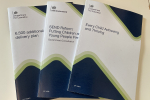We are fortunate to have excellent schools in East Hampshire, outstanding both in results and in pastoral care.
That’s reflected in local schools’ OfStEd outcomes, with around nine in ten rated Good or Outstanding.
Most children of course are at state-funded schools, but as well as excellent state schools, we also have excellent independent schools.
Both our state and private schools locally are firmly embedded in the community and an integral part of our area. Very many felt the loss when Alton School, formerly Alton Convent, recently announced its closure.
With around 2,900 pupils in the East Hampshire constituency at independent schools, we are one of the parts of the country with a relatively large proportion – but not the biggest: there are 44 constituencies with a higher number.
A number of these are in London, others in Surrey or Oxfordshire. But there are also Bedford and Bristol, and constituencies in Birmingham and Greater Manchester.
It sometimes surprises people to hear of the significant number of children at private schools in, for example, Hackney or Salford. In a Parliamentary debate the other day, two of the four MPs in Jeremy Corbyn’s Independent Alliance – one representing Dewsbury, one Blackburn – spoke about the importance of the private schools in their areas.
These schools – small faith schools catering to the needs of Muslim, Charedi and some Christian denominations, and often actually charging less than the average cost of a state school place – are very different from the image that many people may have in their head of a private school.
Elsewhere in the sector are the Royal Northern College of Music and Royal Ballet School, two among 28 institutions where talented youngsters get means-tested state help in recognition that there are no equivalent facilities within the state sector.
Hampshire is a key centre for UK defence. Many children in military families are in the Continuity of Education Programme, that makes a capped contribution towards schooling – often boarding – while their parents are in service to the nation.
Then there are many children with special educational needs or a disability – including many from East Hampshire – in independent schools, which may or may not be designated specifically as special schools. Some of these children have an Education, Health and Care Plan, but others do not (while some again await an EHCP decision).
The new government plan to levy VAT on school fees. It will make us virtually the only country in the developed world where education is taxed.
If Labour want to put higher tax on people with high incomes, they should do so honestly. They should do it through income tax, and they should have said so in the election campaign. They should not try and do it by the back door, in a way that will hit many others too.
As I said in parliament recently (and reiterated at a Q&A on the policy with local parents and headteachers (and fellow MPs Greg Stafford and Jeremy Hunt) earlier this month): “Some parents whose children go to independent school are rich, and some are definitely not. Very many more are in the middle, including many professionals working in our public services.”
Originally expected in September 2025, the incoming government announced after the election that it would do it even more quickly, bringing forward the date to January – part-way through the school year.
I am opposed to the VAT plan in principle – education is just something that shouldn't be taxed. But if the Labour government are dead-set on this plan, at the very least they should delay it until everyone has a chance to plan, and until those already in the run-up to public exams in Years 10 and 11, Lower Sixth and Upper Sixth, have completed their courses. And they should make a full and wide set of reasonable exemptions.
As I write this, we await the Budget. By the time you read it we will know if the government has made concessions.


